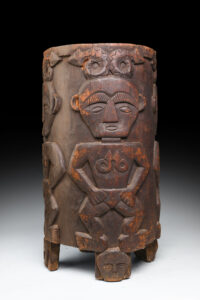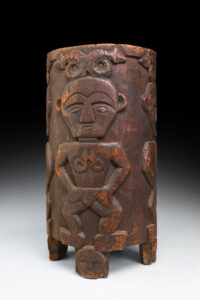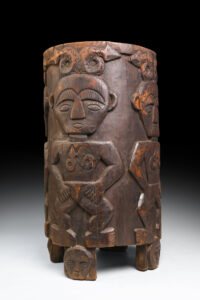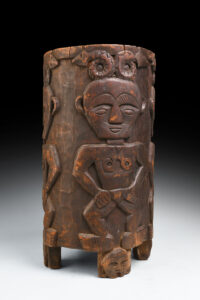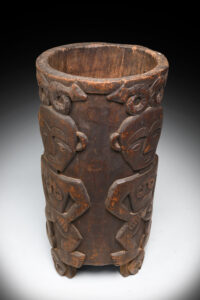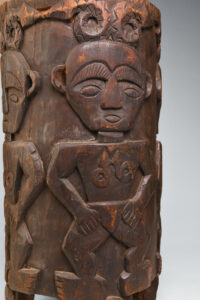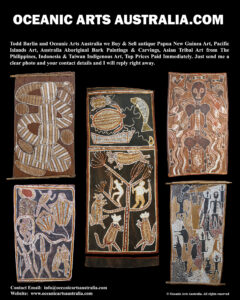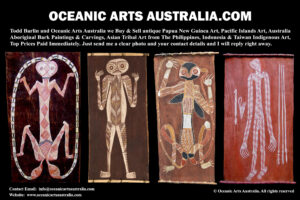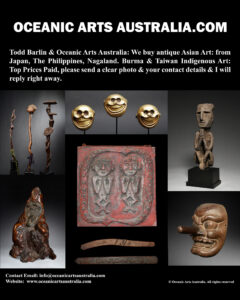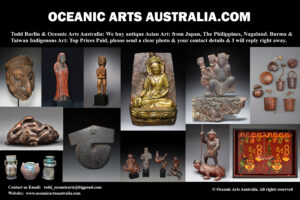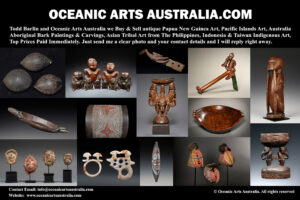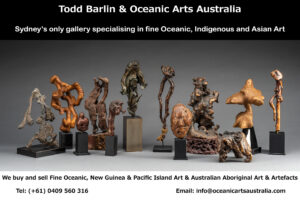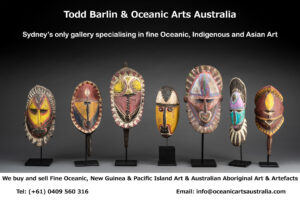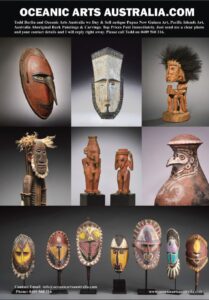A Superb Paiwan/ Rukai Tribe Chiefly Grain Storage Container from Taiwan Formosa Island Late 19th to early 20th Century
| Collection No. | TB-4053 |
|---|---|
| Size | (Size 57cm x 30.5cm) |
A Superb Paiwan/Rukai Tribe Chiefly Grain Storage Container called Puludru from Taiwan Formosa Island Late 19th to early 20th Century
This superbly carved Grain Storage Container called Puludru was used solely by chiefly households for safe storage of their grain. This large Grain Storage Container is carved from a single piece of hardwood, the designs are carved in very high relief which makes the figures look three-dimensional, and there is an encrusted patina from long use over generations.
The Paiwan or Rukai people’s grain barrels are large containers used in all households to store unprocessed food such as millet, sweet potatoes, and taro. Most of these large grain barrels are made by simply hollowing out a solid tree trunk into a cylindrical shape, most household items are not decorated with carvings, but only those used solely by Chiefs or nobles would be carved with patterns such as ancestor figures & snakes like this fine example.
The main crops of the Paiwan people in the early days were millet, taro, sweet potato, peanut, and tree beans, later, due to frequent contact with the Han people, they also began to grow rice.
The main iconography on this container is a powerful figure of a Chief or Deified Ancestor along with the important Two Hundred-Pacer Snakes which are above him and on his chest. The Hundred-Pacer Snakes (Agkistrodon acutus) which is one of the most important characters in Paiwan mythology, and is generally considered to be the pro-creator of the Chiefs and nobles.
The legs of the Storage Container are carved heads which the Chiefs are standing on this relates to the ancient practice of headhunting. The Paiwan is one of the most well-known of the several indigenous peoples living in the mountainous interior of Taiwan. Paiwan society is hierarchical, divided into high nobles, minor nobility, and commoners. In former times, only the high nobility was entitled to create or commission certain forms of human images, which portrayed important ancestors (tsmas). The ancestors, whose supernatural influence was controlled by the nobility, had the power to either help or harm the community, depending on whether their spirits received proper respect through ritual observances and offerings. The houses of Paiwan nobles were both the physical and artistic centres of ancestral power and imagery. The remains of noble ancestors were buried within the houses of their descendants, and their images adorned the doorways, house posts, and other architectural elements and ritual objects like this fine old Grain Storage Container
Provenance: Old Collection Taiwan, The Todd Barlin Collection of Oceanic and Asian Art.
See my new EXHIBITIONS GALLERY showing the Museums and Art Galleries Exhibitions that I provided artworks for over the past 40 years. There is the link to the article about my artworks published in the prestigious Louvre Magazine in 1996
I have artwork for Museums and art Galleries but also for collectors at every stage of their collecting. I want to encourage people to explore the fine art of New Guinea & West Papua and the Pacific Islands and to be able to see and touch the artworks in a relaxed and friendly manner in my Sydney Gallery. I would like to invite you to visit my gallery and see the artworks in person and also look at my website www.oceanicartsaustralia.com where there are many Galleries & Sub Galleries to explore.
My Gallery of nearly 40 years is the last physical gallery in Sydney that specializes in New Guinea and Oceanic Art. Sydney is very close to New Guinea & the Pacific Islands where all of these amazing artworks came from, Australia’s closest neighbours.
To see many more rare items and the finest masterpieces, please make an appointment with us to visit the gallery.

